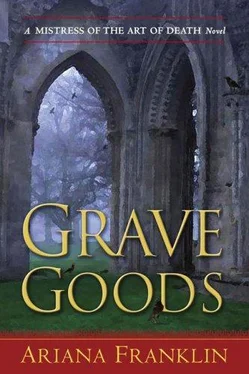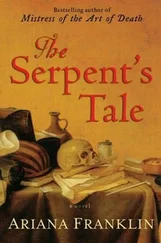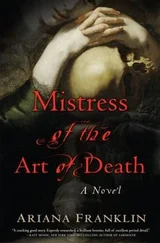She had not, hadn’t needed to; she’d heard most of his book. In the forty years since Geoffrey’s History of the Kings of Britain had been written, it had gained unstoppable popularity. Apparently recording the descent of Britain’s kings over two thousand years and giving them an ancestry from the Trojans, those literate enough to read its Latin had passed on its stories to those who could not, wonderful stories of adventure and love and war and magic and religion-and most wonderful of all was the tale of King Arthur, who had stood against the pagan Saxon invaders and created a Golden Age of chivalry somewhere in the mist of Britain’s Dark Ages.
Arthur had caught the country’s imagination and still did. Tales of his prowess, his knights and battles, his marriage to Guinevere, her sexual treachery, were told by professional and amateur storytellers in palaces, on manors, in marketplaces, and around cottage fires.
At each inn Adelia had stayed in on her journey with Emma, somebody had been prepared to entertain the guests with one Arthurian legend or another, sometimes with embroidery that even Geoffrey of Monmouth wouldn’t have recognized. More than that, nearly every town and village they’d passed through laid claim to a shred of the legend, boasting of a local Arthur’s well, Arthur’s chair, Arthur’s table, Arthur’s mount, Arthur’s hill, Arthur’s quoit, Arthur’s hunting seat, Arthur’s kitchen…
His fame had even spread to the continent-Adelia could remember her foster mother in Salerno telling her about Arthur’s exploits on Vesuvius. The stories appealed to women like no others; Emma adored them. “Don’t you just love the bit where Uther Pendragon steps out of the darkness at Tintagel and seduces Ygraine?” she’d said.
“Well, yes, but isn’t the account that he’s taken on the appearance of her husband somewhat implausible?” Adelia had asked.
She’d been charged with lacking romance in her soul. “I suppose you prefer reading about boring things, like people’s innards,” Emma had said with some truth.
Prior Geoffrey, on the other hand, loathed the book and departed from his usual respect for the dead by heaping opprobrium on the late Geoffrey of Monmouth. “Called himself a historian?” he would say. “The man had no more idea of history than a carrot. He made it up.”
It infuriated the good prior that some, especially the females, among his flock paid more attention to Geoffrey’s History than to the Bible.
“Oh, yes, they remember the story of Arthur killing some giant who’d been slaking his lust on a fainting maiden, but quiz them on what the Parable of the Sower is about and they can’t answer. Giants, I ask you. Geoffrey of Monmouth a great historian? Great liar, more like.”
Yet here, Adelia thought, was Henry Plantagenet, most rational of men, giving credence to fairy stories and visions.
He had to have an ulterior motive.
Waiting to discover what it was, she was taken by the arm and led to the window so that she could look across the pleasant, though sadly churned up, valley of the River Usk.
“Looks quiet, doesn’t it?” the king said. “But two days ago I had to carve my way through besieging Welsh lines a hundred thick to relieve young Geoffrey. And do you know whose name the bastards were shouting as we struck them down?”
“King Arthur’s?”
Henry nodded. “Arthur’s. The Welsh are supposed to be a Christian race, but their pagan little minds hold Arthur as a more immediate Messiah than Jesus, God rot them. They claim him as their own. He’s the one who will rescue them from what they see as the Norman yoke. And I’m not a Norman yoke, Adelia. For one thing, I’m an Angevin, and for another, I’m a bloody good peace-bringing, justice-giving king, if they’d only realize it.”
She nodded. For all Henry’s sins, that was what he was.
He turned away from her in order to look over his scribe’s writing and point out a correction. “Four 1’s in Llewellyn, Robert.”
Then, as if in disgust with himself for doing it, he shook his fists in the direction of the ceiling. “Why do I have to bother with spelling their damn names, eh? I’ve more important things to do. I’ve got trouble in Aquitaine, Louis of France is being his usual pain in the arse, the sodding Scots need driving back over the border… and where am I? Stuck in a bloody bog, trying to stop rebellion spreading through the entire Welsh nation.” He struck the table, making the scribe’s inkwell jump and spill. “I haven’t got time to put out every little fire the belief in a living Arthur lights among the Celts. Which it does.” He glared at Adelia as if she’d refute it. “The bloody Bretons are already threatening revolt. It’ll be the sodding Cornish next. Damn all Celts.”
“Ah,” Adelia said. Light had dawned, hence the coffin at Glastonbury. “You need Arthur to be dead.”
“Exactly.” Henry’s anger left him and he became persuasive. “And that’s where you come in. You’re my clever little mistress in the art of death. Prove those bones are King Arthur’s beyond resurrection and I’ll double what I pay you.”
“You don’t pay me,” Adelia said wearily.
“Don’t I? Are you sure? Well, this time you’ll have a warrant enabling you and your company to receive every assistance and sustenance for as long as you require-expenses to be sent to the Exchequer.”
As Adelia opened her mouth, the king’s forefinger wagged it shut. “Yes, I know,” he said. “Nobody’s going to accept the findings of a woman, but I’ve seen to it. Glastonbury’s been told that I’m sending them an expert in skeletons, my own Lord Mansur”-Henry bowed to the tall Arab, who salaamed back-“to authenticate the bones of King Arthur and Queen Guinevere, if indeed those are what they are. The monks won’t like having a Saracen and a female on their sacred ground, but they can damn well put up with it. And I’ve sent ahead to the best inn in Glastonbury to accommodate Lord Mansur, his female assistant and interpreter, her child, and a nurse, in luxury, for as long as the investigation lasts. At my expense.” The king was pleased with himself. “What do you say to that?”
Adelia summoned up her courage. “I don’t think it can be done, my lord.”
“Why not?”
“Skeletons are merely… skeletons. I doubt it’s possible to say how old they are.” She steeled herself. “Unless there’s some other identification in that coffin, I cannot name those bones as Arthur’s and Guinevere’s. I’m sorry.”
The room seemed to hunch in anticipation of the king’s fury-in the past, when crossed, he’d been known to roll on the floor, biting its rushes.
But he was older now, and the anger that had caused the death of Thomas à Becket was contained-for today, at least. He nodded quietly. “I was afraid of that,” he said. “Then we’ll try another tactic. You’ll go to Glastonbury and make sure no living person can say that those bones are not Arthur’s.”
She was puzzled. “I don’t understand you, my lord.”
“Yes, you do. If Glastonbury broadcasts news of this wondrous discovery, I don’t want some bugger popping up to say it’s their Uncle Cedric and Aunt Priscilla in that bloody coffin. You’re to find out whether anybody can refute the abbey’s claim.”
“How can I possibly do that?”
“I don’t know, do I?” The king was exasperated. “That’s why I’m employing you, for God’s sake. You’ve got a nose for it; you can detect a puzzle like a hound sniffing the scent of boar-and solve it. I’ve seen you do it. You’re a tracker. What I want you to do is ensure there isn’t any scent, that there’s no boar hiding in the undergrowth.”
Now she understood. “You mean that as long as nobody can say those skeletons are not Arthur’s and Guinevere’s, they will be declared as Arthur’s and Guinevere’s, whether they are or aren’t?”
Читать дальше












